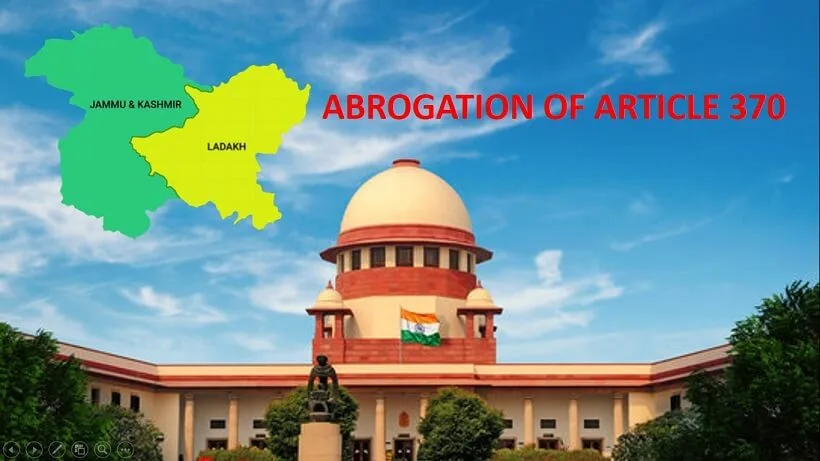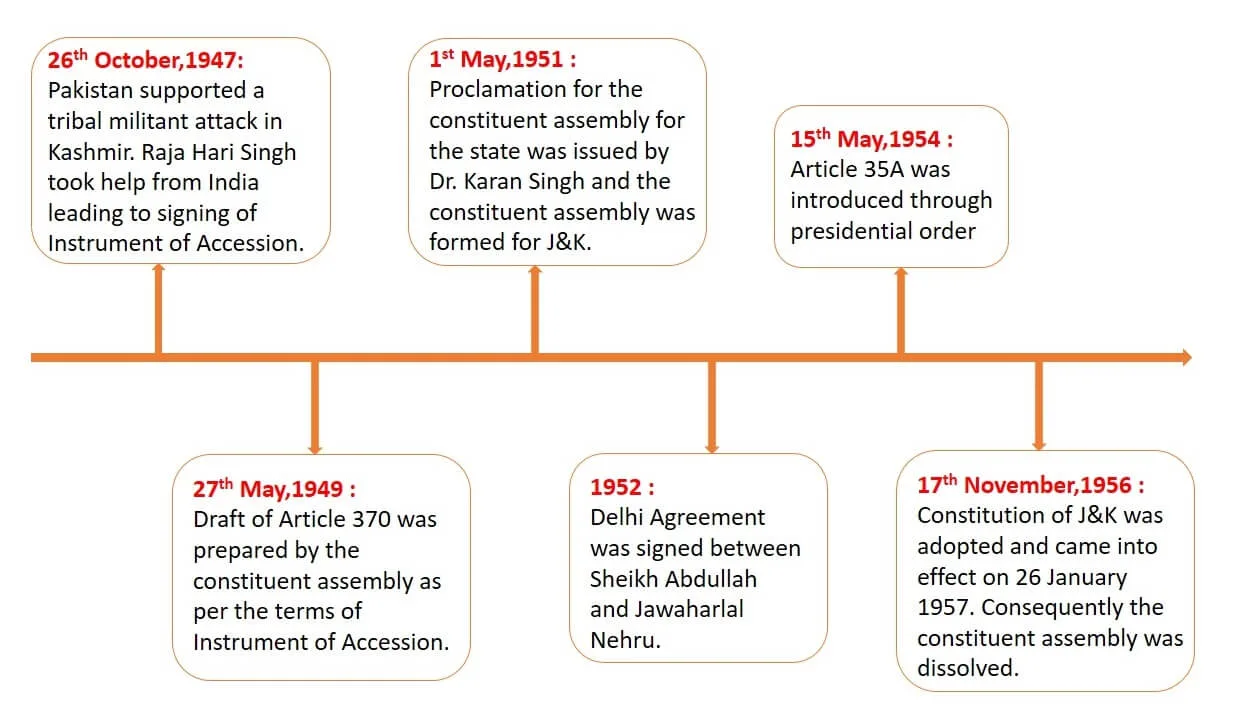
Jammu and Kashmir (J&K) ever since it has been included in India, it has been a subject of significant debate and discussion due to its special status under Article 370. The special status of Jammu and Kashmir makes it responsible for the present condition of the state. So, the agenda of this blog is to discuss the historical background. Additionally, to explore the special status of Jammu and Kashmir. I will also throw some light on its relevance and the implications of its abrogation.
Historical Background
In 1947, like other princely states in India, Jammu and Kashmir which was under the reign of Jamwal Rajput Dogra Dynasty since 1846. It had some autonomy, but the real power was with the British. In 1947, when India gained independence from British rule, the ruler of Jammu and Kashmir, Hari Singh too wanted an independent status for his state. He tried to negotiate with both India and Pakistan for an independent status and proposed a Standstill Agreement. On August 12, 1947, the Prime Minister of Jammu and Kashmir sent a common message to both India and Pakistan about this proposal. Pakistan agreed to the offer and responded on August 15, 1947. Whereas Raja Hari Singh was asked by India to send his representative to Delhi for further discussions on the matter.
However, on 26th October 1947, Pakistan broke the Standstill Agreement by supporting a tribal militant attack in Kashmir. In response, India promised to help, but with a condition that Maharaja Hari Singh must sign the Instrument of Accession. Maharaja Hari Singh eventually signed the Instrument of Accession with India in 1947. It was agreed that once the situation in the region stabilized, the views of the people of J&K would be taken into consideration to determine their future.

Article 370: The Cornerstone of Special Status
The ruler of Jammu and Kashmir signed the instrument of accession, wherein the state only surrendered three subjects – External affairs, Defense, and Communications – to the Indian Union. Thereafter Article 370 was created with the understanding that it would be a temporary provision.
Due to this article J&K enjoys a higher degree of autonomy compared to other states and the power of the Union of India is limited concerning J&K. Some of the circumstances where the power of Union government is limited with respect to J&K are:
- The Union of India cannot declare a financial emergency or emergency due to a failure of constitutional machinery in J&K, except in cases of war or external aggression since defense matters were surrendered to the Union.
- The Union Legislature cannot make laws on matters listed in the Union list and Concurrent list if they are not in accordance with the subjects mentioned in the instrument of accession.
- Moreover, any decision that affects the State of J&K requires consultation with the State Government.
Essentially, the Union of India can act independently only on issues directly related to the three subjects surrendered or those specifically mentioned in the instrument of accession. This unique arrangement has given Jammu and Kashmir a special status within India’s constitutional framework.
Key Provisions of Article 370
- J&K had its own constitution, separate from the Indian Constitution. This enabled the state to have its own set of laws and regulations.
- Article 35A, which derived its authority from Article 370, granted special rights and privileges to the residents of J&K, primarily related to property ownership and employment.
- The state had its own legislation and decision-making authority in various domains, apart from defense, communications, and foreign affairs, which were under the jurisdiction of the Indian government.
Implications of Special Status
The special status of Jammu and Kashmir was seen as a way to accommodate the diverse aspirations and identity of the people of the region. However, over the years, it also led to debates and controversies for several reasons:
- Integration and Unity: Critics argued that the special status created a sense of separatism and hindered the full integration of J&K with the rest of India.
- Socio-economic Development: Some experts believed that the special status impeded economic growth and development. Some central laws did not apply to the state, affecting investments and industries.
- Political Tensions: The special status often fueled political tensions between different regions of the state, leading to diverse demands and aspirations.
Abrogation of Article 370
5th August ,2019
President of India Ram Nath Kovind issued a presidential order called CO 272. This order allowed the central government to change Article 370 without needing approval from the Constituent Assembly. They achieved this by making changes to another part of the Constitution i.e., Article 367. A new clause 4 was added to the Article 367, which explains how the Constitution should be understood. The modification replaced the mention of the ‘Constituent Assembly’ in Article 370(3) with the ‘Legislative Assembly’.
All this modification was made because at that time Jammu and Kashmir was under President’s Rule. It means that the powers of the J&K Legislative Assembly were given to the Union Parliament. In no matter of time, the Rajya Sabha recommended the removal of Article 370 through a Resolution under Article 370(3).
6th August,2019
President Kovind issued another order called CO 273, which put the Rajya Sabha’s recommendation into action. As a result, all sections of Article 370 stopped being effective, except for clause 1 of Article 370. It was changed to state that the Indian Constitution applies to the State of J&K. This essentially removed the special status that J&K had before.
9th August,2019
Finally, the Parliament divided the State of J&K into two separate Union Territories. It was done through the Jammu and Kashmir Reorganization Act, 2019. The two new Union Territories are J&K and Ladakh, but only J&K retained a legislative assembly.
Abrogation Challenged in Supreme Court
A lawyer who contested the abrogation of Article 370 in the Supreme Court put forth an interesting argument. He believed that Article 370 became a permanent part of the Indian Constitution after 1957. The reason behind this was that the Constituent Assembly of Jammu and Kashmir, which was essential for any changes to Article 370, no longer existed. Since there was no authority left to provide consent for altering or removing Article 370. He contended that Parliament had no right to revoke it in August 2019. According to him, Parliament lacked the power to abrogate Article 370 because it did not possess the recommendation of the Constituent Assembly of Jammu and Kashmir. It was the prerequisite laid down by Article 370(3).
The special status of Jammu and Kashmir has been an integral part of India’s constitutional history. While the abrogation of Article 370 marked a significant turning point, the debate about its implications and the future of J&K continues. Now everything depends on how the five judges bench led by Chief justice of India D.Y Chandrachud. The bench comprises of Justice Sanjay K. Kaul, Justice Sanjiv Khanna, Justice B.R Gavai and Justice Surya Kant interprets the abrogation. It is crucial for policymakers and citizens to engage in constructive dialogues to address the concerns of all stakeholders. It should further work towards a more inclusive, prosperous, and peaceful future for the region. Instead of driving our own conclusion lets waits for the learners of the constitution to decide on this critical issue.

Very good
Nice article
Very well explained
Small but informative it is and very well written and presented.